Former Mongols Matt and Tyson Ward open up about their violent past, life behind bars and their role in a new organisation which hopes to slash the high rate of inmates returning to jail.
There was a time when Matt Ward, as president of the Mongols Motorcycle Club in Adelaide, imagined that his young son would one day follow in his footsteps into the bikie lifestyle of camaraderie, booze, women, violence and drugs. “And then,” he says softly, “I grew up.”
Ward, 43, was a bikie for about 15 years before quitting in 2018. He’d been drawn in by a sense of belonging he’d not experienced before, but says he left disillusioned. His twin brother Tyson, a promising basketballer, had joined a couple of years after him. Together, they were a notorious and intimidating pair, with Tyson – complete with facial tattoos – towering to 210cm, just under seven feet, and Matt not much shorter.
They started with the Finks, which later became the Mongols. They say they were looking for brotherhood – “people that were willing to do for me what I was willing to do for them,” says Matt. The fact those things might be illegal and often violent was just part of the lifestyle and their idea of fun.
Matt, for example, recalls how the gang used to require its members to be tested for their violence. “And if you weren’t adept to proper violence there was a good chance you were going to get bashed and thrown out,” he says. “There were instances where people coming into the club, you’d take them somewhere and they’d go white with what was happening and they didn’t have the stomach for it.
“Back then you knew they weren’t going to last long. See you later. And if you had the stomach for it, well then you kept going. Always, through life, if I want to do something I’m going to do it properly … I just wanted to be the best bikie I could.”
Tyson was the same. He became infamous quickly, before he was a proper member, for his role in the Ballroom Blitz bikie brawl at the Gold Coast in 2006 when the Finks had a Wild West shootout with the Hells Angels. Tyson was described by a magistrate in 2008 as being a minor actor but convicted of assault occasioning actual bodily harm and fined $3000. By then he was a fully-fledged Fink.
Like his brother, he put a premium on loyalty. He was ambitious: he wanted to make the Finks Terror Team, a select group of rule enforcers within the gang, and he did. Later, when the gang “patched over” to the Mongols, he wanted to be president of his own chapter, in southern Adelaide, and he did that too.
He was also violent. If the gang went out to drink, it was likely there’d be punch-ups. “There were a couple of times where I woke up in the morning and thought I’d better turn the news on – because some of the bashes were quite horrific and there were times when I thought, ‘I hope I don’t hear the police knocking at my door saying I’ve killed someone’,” he recalls. “But saying that, I’d go out the next day, go to the pub, and get into another fight.”
No longer. Over a couple of days, in separate interviews for this article and videos shot for advertiser.com.au in the corridors of Old Adelaide Gaol, the Wards run through a potted history of their lives with the aim, they say, of imparting a few lessons. In short, they seek redemption. Matt says he wants to be a better father. Tyson says he wants to warn young people against a gang culture he says isn’t based on loyalty and brotherhood but greed and ego.
Like Jacob Marley’s ghost in A Christmas Carol, they sound worried about the heavy chain of wrongs they’ve wrought in life to date, and insist they want to make amends while they can. To do so, they have joined Arcofyre, an organisation set up by former inmates Kirby Brownlow, an ex-soldier and armed robber, and Henry Keogh who spent two decades in jail for the alleged 1994 drowning of his fiancee Anna-Jane Cheney. He was released after an appeal in 2014, but police say he remains a suspect.
Arcofyre’s members aim to leverage their personal experiences of prison and crime to help rehabilitate ex-prisoners and cut the rate of recidivism that sees an estimated 45 per cent of released inmates back in the correctional system within two years. Stopping just one person from taking that path would save taxpayers money: the full cost of keeping a prisoner is estimated to be $111,000 a year.
It’s a revolving door that needs to be urgently slowed. Arcofyre argues current programs are not working and it’s time to try something different. Its members have been on the inside, and can make a difference, it says, if they’re given a chance.

Tyson is mentoring young people in trouble, Matt is training to be the organisation’s operations manager. “I want to help Arcofyre grow, get the word out, and help the community through them,” he says. “Kirby’s got great vision and if anyone can make his model work it’s him. He’s a hard worker and has a lot of compassion and drive to help people.”
The ex-bikie agrees many will think a leopard cannot change it spots. “You can talk until you’re blue in the face, but actions are always going to prove it to people,” Matt says. “I know police are looking at us, everyone is looking at us: what’s the catch, what’s the hidden agenda? So there’s no point me saying anything to them, I’ve just got to let my actions speak for myself and they will soon see it’s legitimate. People can change.”
Keogh says it’s the “lived experience” of himself, Brownlow and people like the Ward brothers that can make a difference with former prisoners, helping them look for jobs and accommodation, as well as through counselling.
“We’ve been on the dark side with prison, so we know exactly what they’re going through and they know we’re not just pretending,” Keogh says.
“We have got a large body of lived experience, and that’s not just a sexy catchphrase. It’s something that has real meaning and impact with ex-offenders.”
He says there’s nothing like enough support for prisoners when they are released. Often inmates have no family or support network, and the amount of money they earn in prison is so small it would barely pay for a taxi, never mind a bond for a place to rent.
“They get out, they have no roof over their heads and it may be the middle of winter – you don’t really feel well disposed to the rest of society,” Keogh says.
“You feel as though you’ve been dumped out there and no one cares. And if they feel they’re making no headway because they’re hitting one wall after another, it’s ‘What the hell, I might as well go back to drinking, take some drugs.’”
Brownlow knows how easy it is to do. Arcofyre’s chief executive left the army in 2006, and by 2009 was serving an eight-and-a-half-year sentence for armed robberies. He was released after serving five years, but was quickly back doing crime, including acting as an independent contractor to bikies. In six months he accumulated enough offences to be facing a long stretch. Back in jail, he served just under four more years before his release in 2017.
“I always say that the street calls you when you get out of prison,” he says. “It’s an entity of its own that whispers your name and says, ‘Come back, come back, I’m here’.”
It was while he was serving his second term in prison that he realised he never wanted to return. “I decided to give that voice the finger.”
Like many who end up in jail, Brownlow had a difficult childhood, with 19 foster home placements before he was four, followed by a decade with one family. He had a troubled relationship with his birth family, and a feeling he was different to other kids.
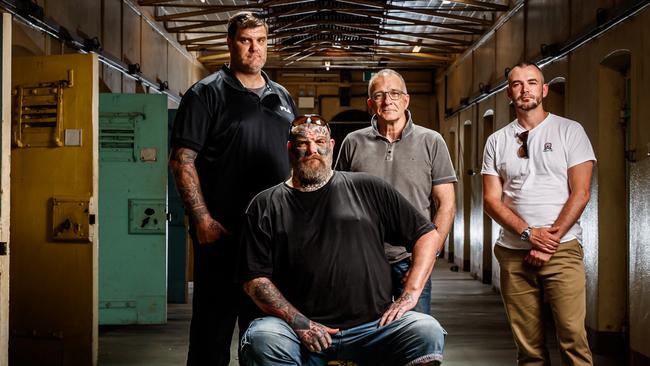
The 36-year-old says he was a bit of a ratbag at school, but liked adventure and was looking for a place to belong. He joined the air force cadets, volunteered at the YMCA, went out with Operation Flinders, which works with troubled youths, and eventually joined the ADF’s infantry, based at 1 RAR in Townsville.
But while he loved the army’s brotherhood, he drank too much, ended up in military detention, and missed deployments. At 22, after four years, he decided the soldier’s life was no longer or him.
“When I got out, that’s when everything started to fall apart for me,” he says, citing mental health struggles including anxiety and depression. What he found in place of the army was more booze, drugs – coke, cannabis, ice, ecstasy – and a violent criminal lifestyle to pay for his addictions.
“I liked the excitement, the parties,” he admits. “There was a large amount of power and respect I’d lost as a soldier, and violence is a currency in the criminal world.” But with “the amount of drugs I was on, I was going to end up in a mental institution … jail, or even death”.
He did stupid things when he was high. His disguise in one armed robbery was nothing more than a hat. “It was a self-destructive spiral. I pretty much opened the door of the prison and walked in myself.”
He was also angry, and didn’t know how to control it. “I … would go from frustration to a full-blown rage in the click of a finger,” he says. “I could have killed someone.”
Jail was, even for a violent person, frightening. Threats and uncertainty bred fear, and then there were outright brawls with whatever weapons were available. But it was also boring, and in his second term he started to see he had to change.
One turning point came thanks to a liking for Milo, offered to prisoners attending Christian outreach group Kairos at the chapel. He joined and the message resonated. “I saw love being pushed straight into the prison by Christian men coming in,” he says. “They supported me a lot when I was released from custody.” Today, he says he remains involved with Kairos Prison Ministry, providing advice, raising awareness, and attending church.
Brownlow says he began to feel remorse for the harm he’d done. A judge had called him a coward, a terrible insult for a soldier, and he knew that was right.
Then, one day he was typing a letter on a prison computer to apply for parole, and a prisoner next to him saw what he’d done and was impressed. “Can you help me write mine?” he asked. It was from there that Brownlow says he started to see that “being able to assist people gave me more than taking from them”.
But he’d also learned that prison was a school of criminality and it was hard for prisoners to change their ways. He knew inmates didn’t listen much to outsiders who counselled them.
Hadn’t he done a violence prevention program on his first stint and gone straight back to his old ways? Yet despite wanting to give things a “good honest go” when he got out, he found nobody wanted to take a chance on him. On his national police certificate were seven convictions from aggravated robbery to assaults.
So, he says, he decided to back himself and set up Arcofyre’s Offender Rehabilitation Service – arcofyre.com.au – in 2019 with Keogh and two other ex-prisoners who he says wish to stay anonymous.
Brownlow says about 160 people have been helped. “Probably two out of five we are finding are able to gain employment, rekindle relationships with their family,” he says. “Relationships are important for people when they get out. If people don’t have a community and might not have friends or family they associate with, well then Arcofyre is a community and they can join us and we can assist them.”
He says the group has links to some community groups like the YMCA, Veterans SA, and hepatitis SA but hopes that government departments and businesses will see that Arcofyre can play a role. But the Department of Correctional Services has said it has no community grants available.
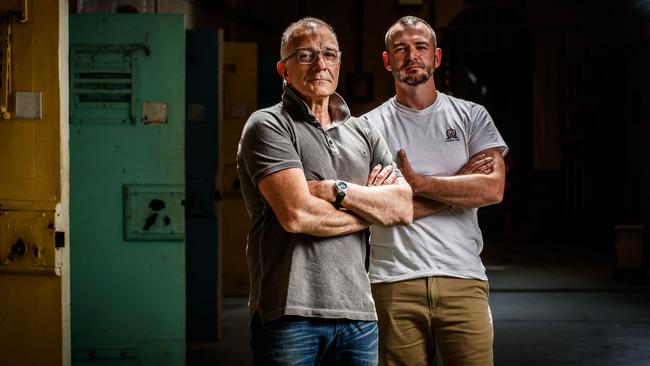
A spokeswoman says DCS worked with a number of established community-run organisations with experience supporting offenders to reintegrate into society.
“Effective pro-social community support, along with support for other individual needs such as mental health, disability and housing services are known to be important for successful reintegration,” she said – but added the department didn’t see “any current opportunities” for Arcofyre.
Brownlow argues Arcofyre is worth investing in given the money that could be saved keeping people out of jail.
“We should be at the policy table, should be involved in peer mentoring,” he says.
Doctors, clinicians, social workers had little credibility with inmates. “I’m not going to listen to you, I’m not,” he says of the prisoner mentality. But someone who has been through the system will have authority.
He says he is now in a long-term relationship, off drugs and hoping to start a family. He continues to receive mentoring by Keogh, who also helps Tyson Ward. Keogh knows how to point out his flaws in a helpful way, he says.
“I’m very hands on with both Kirby and Tyson,” says Keogh, acknowledging both men need continuing support. “No matter how much we know intellectually, there still is this thing inside us which operates at the emotional level. And emotions get responded to far quicker than mental actualising. So there are reflexes they might have brought from a previous era, jail or pre-jail, that aren’t serving them now. But sometimes people will fall back on reflexes under stress.”
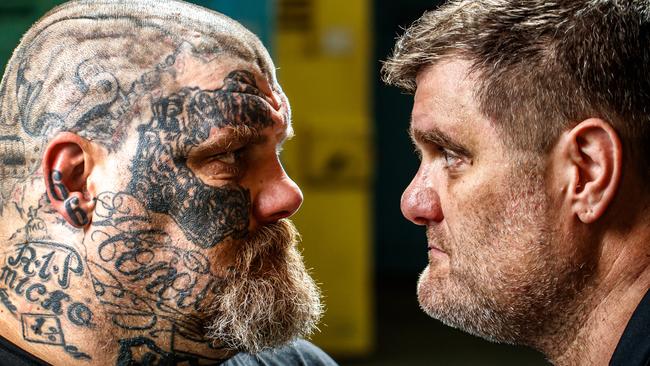
Unlike many people who end up in jail, the Ward brothers did not come from a broken or dysfunctional family. Their father was a doctor, their mother stayed at home, a sister become a successful academic and they had loving grandparents. But both struggled to fit in.
Both say they didn’t have many friends at high school and often relied on each other as best mates. They had different teenage experiences though – Matt suffered a life-threatening cancer in his wrist and missed a lot of school. Tyson’s basketball skills earned him an Australian Institute of Sport scholarship for two years, and in the mid-1990s, interest from the Adelaide 36ers. When that fell through, he lost interest in the game.
Matt, meanwhile, had got his electrician’s ticket and had started working in fly-in fly-out mines. A tattooist pal in Alice Springs knew some Finks there, and Matt joined the gang in around 2004. Tyson followed a couple of years later.
By then, Tyson was already a big drinker, through basketball, and a drug-taker from work as an interstate truck driver. What he says he liked about the gang environment was the feeling of camaraderie.
“I’ve never really been scared of anyone or anything; I thought it would be fun and exciting, why not?” he says. And then when he was charged for fighting during the Ballroom Blitz brawl, “I figured I’d jumped in with two feet, so I may as well keep going with it”.
In the early days, he says, it really felt like a brotherhood. A typical day was getting up and going out with his mates drinking – “it was partying three or four days a week and recovering the other two or three”. But the fun, which usually involved a fight at some pub, was often at the expense of others.
That came to a halt when, after being found in possession of a Chinese assault rifle and 3000 ecstasy tablets, he spent two-and-a-half years in jail. The rifle, he says, was for his own protection from another club. Jail did not bother him, and given the booze and drugs he was consuming, probably saved his life, he thinks.
He was a rules enforcer in the Finks. And later, when they “patched over” to the Mongols, he became president of his own chapter of that gang. He had his hands full keeping the peace.
“The phone never stopped ringing,” he says. “I had a chapter with two factions in it, where one side didn’t get on with the other side so that it was a full-time job trying to keep both sides from not smashing each other’s heads in.”
Still, he says he enjoyed it for a while, but over time became disenchanted with changes in gang life. He insists the gang never ran crime, but readily acknowledges members were free to do so. Membership cost $50 a week, he says.
Individual greed was what turned him off, he says. It became about cash not camaraderie. “Two blokes I considered my closest mates in the club turned on me for money and sided with another member who I had an issue with,” he says. “All over money. And I thought if that’s the way the gang’s going … that’s not why I joined up. It’s not the brotherhood anymore.”
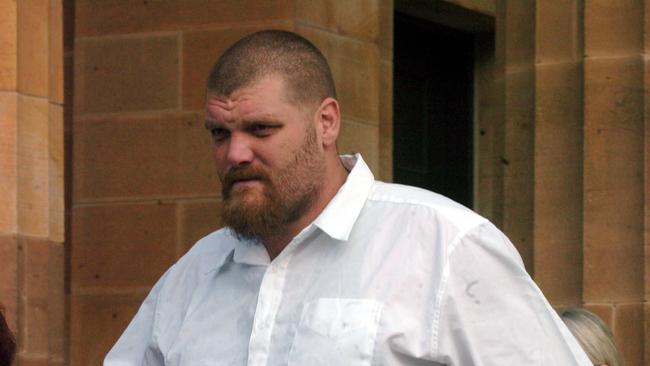
In 2017, he sent his colours back, but kept his bike. He says he refused offers from other clubs, and instead holed up at home, mostly alone, some of the time depressed. He had no money, he says, but “I’d rather be broke and battling than go back to a life with values I don’t think are there any more, to make a dollar.”
He hadn’t a clue what he was going to do. He had made some “silly decisions” with tattoos, had a criminal record, and the upshot was he couldn’t find work. Arcofyre stoked new ambitions, he says.
“My focus is to get to kids before they go down that path,” he says. He says he’d love to go into high schools to warn kids off the gang and criminal life. He’s currently mentoring a young man from the northern suburbs charged over a fight and theft of property. The 19-year-old had been in trouble before, and could face a jail term.
“We talk on the phone, try to catch up once a week. He knows my phone is on 24/7 to call. He came around with his mum the other day before he goes to court for sentencing – it’s letting him know people out here care, helping him stay on the right path and not slip.”
How does he feel? “Proud of myself,” he says. “That I’m actually doing good with my life, that I’m helping people instead of hurting people. It’s given me a purpose.”
He wants people to look past his size and club tattoos. “Don’t judge a book by its cover,” he says. “It’s possible for people to change no matter how bad they have been or what they have done.”
It’s a message he hopes his parents get too. “I’ve reconnected recently. It took them a while to realise I’ve actually changed as a person and was trying to change my life and go down the right path after the years of hell I’d given them.
“I’ve just got to give back. I’ve got to balance my ledger. At the moment it’s well off kilter. I want to leave this Earth leaving a positive footprint instead of a negative one. To do that, I’ve got to start now.”
Tyson got out of the bikie gang relatively easily because his brother Matt was president of the Adelaide chapter. When, about nine months later in 2018 Matt decided to quit, it wasn’t so easy. He made the announcement, challenged anyone who had an issue to take it outside, but nobody did. Later they tried to get his bike taken away, but it didn’t happen, he says.
He’d been in the club for years, led a criminal life, and had no problem dishing out violence. He thrived on it, he says, and it made him feel tough. But “now looking back on it, there’s nothing tough about it”.
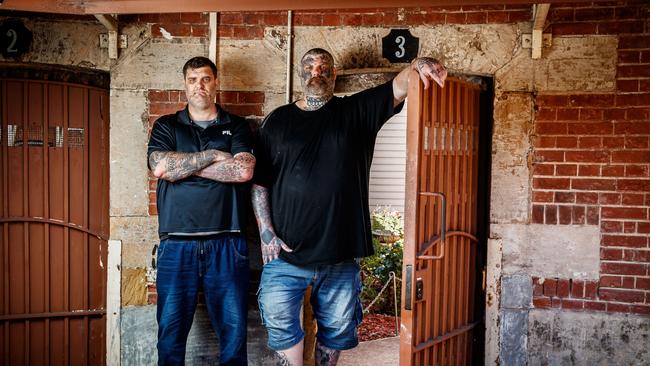
Matt lost his mining job for possession of a gun. He spent three months in jail for refusing to talk to the Australian Crime Commission and served two years for stealing a Lamborghini in Victoria. He fully expected that there would be other jail terms down the track.
But after he came off parole and took custody of his son, he realised that this was not the life he wanted for him. It was later, at a formal meeting with his former partner over the boy, that he remembers the mediator looked at him like he was a “scumbag”. It was, he felt, the club.
At that stage he was president, a job he insists he’d never sought. He took it hoping he could return the club to the “old values” that had attracted him. But it wasn’t working, and his brother had already seen that and quit. A week after that mediation over his son, then about eight years old, he says he quit the Mongols.
“It’s not what they advertise,” Matt says to anyone thinking of going down that path. “There’s no brotherhood anymore. It’s about money, and treachery is rife in the clubs. So if they’re looking for camaraderie, join a sporting club.”
Now, he says, he is guided by what will make him a worthy father. “He’s an influence in everything in my life,” he says of his son, Jaylen, who he says has learning issues, ADHD and difficulties socialising.
“He gets bullied at school consistently. And the harder he tries to fit in, the worse he gets it, the worse it is. So yeah, he’s like my whole life really. I wouldn’t change anything. Everything I do is for him, basically. I want him to be proud of me.”
Like his brother, Matt says he suffered depression when he left the club. He says the bank took his house. He had no money from his gang days, he insists. And for a while he had left the Mongols but not the lifestyle – those ways took longer to shake.
Until 18 months ago he was still a very angry person who would fly off the handle at a car that might cut him off. Jaylen, now 13, would see it, and think “that’s just dad”. But now, he says, the boy knows his dad was wrong to do that.
“He’s a good boy, so he knows what’s right and wrong,” he says. These days in a better state of mind, he tells the boy about the club life, and how he is ashamed of what he’s done, how it never got him anything, and why his greatest regret is joining up.
“And my favourite thing to say is violence only causes two things – pain and trouble,” he says.
“As soon as I start that sentence, he finishes it off for me. So he can see what I’m doing and why I’m doing it.
“And I think it’s sinking in that basically I risked my life getting out of the club so that he didn’t go down that path. And I think he’s grateful and hopefully proud.”
READ MORE: The Focarelli Files: SA’s most notorious gangster and his road to reformation
READ MORE: How police are shutting down bikie lairs across Adelaide
READ MORE: In this weekend’s Sunday Mail: Henry Keogh – the poison I won’t drink

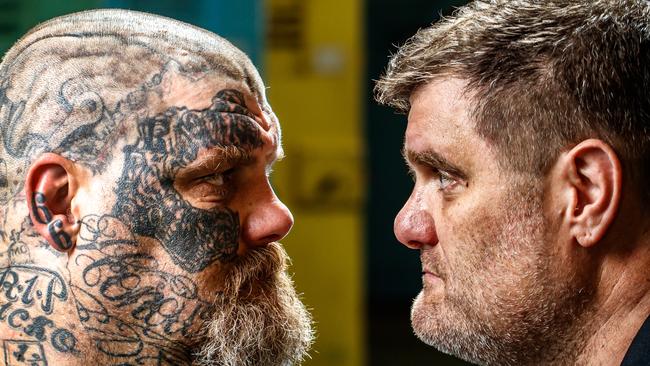
Add your comment to this story
To join the conversation, please log in. Don't have an account? Register
Join the conversation, you are commenting as Logout
‘I charge $2000’: The rise of pay-per-hour cuddlers
There’s a rise of lonely Australians paying for cuddles to make them feel good – and professional cuddler Missy Robinson is making a decent wage offering her services.
What is the common collective noun for a group of lions?
What is a mature male goose called? How many metres are in a kilometre? Take our weekly Brainwaves quiz – 50 mind-bending general knowledge questions.